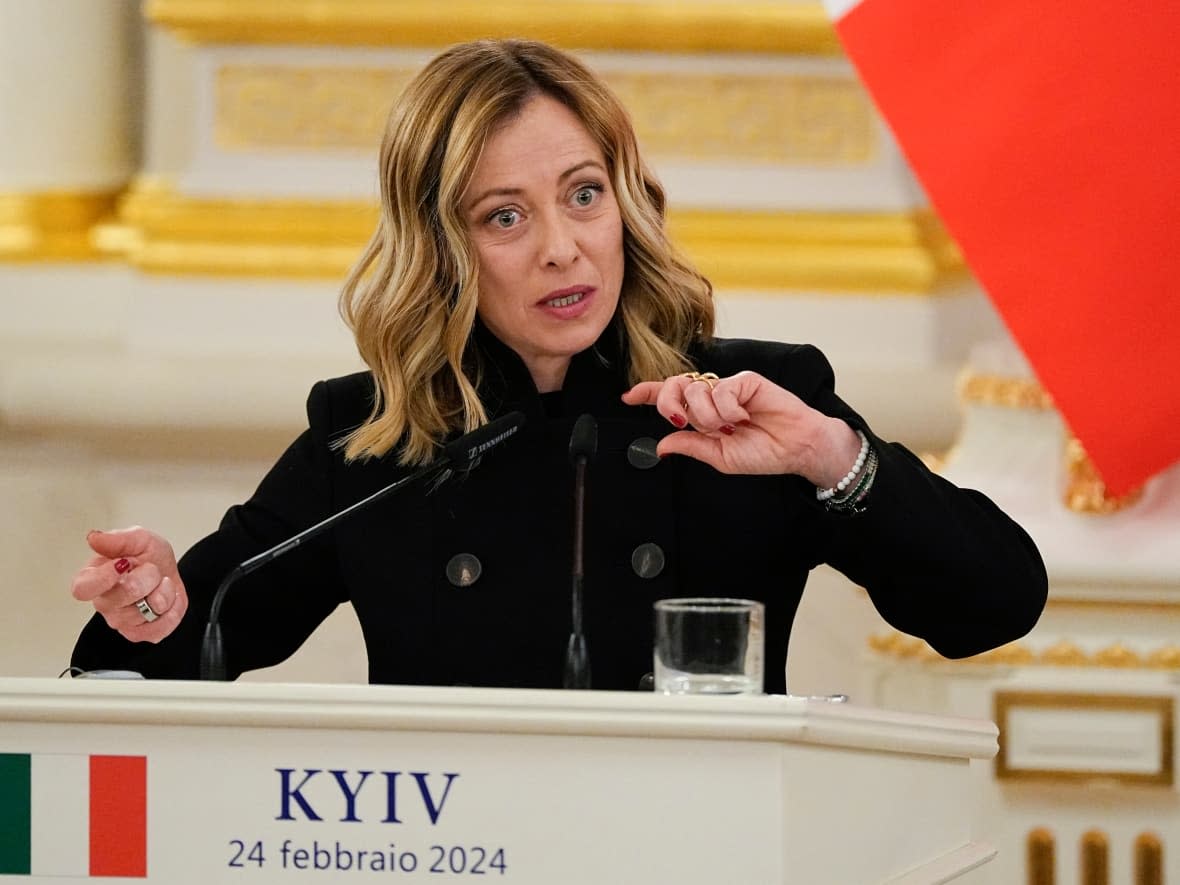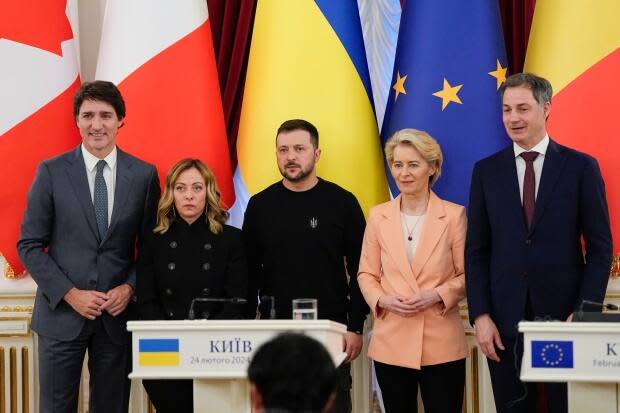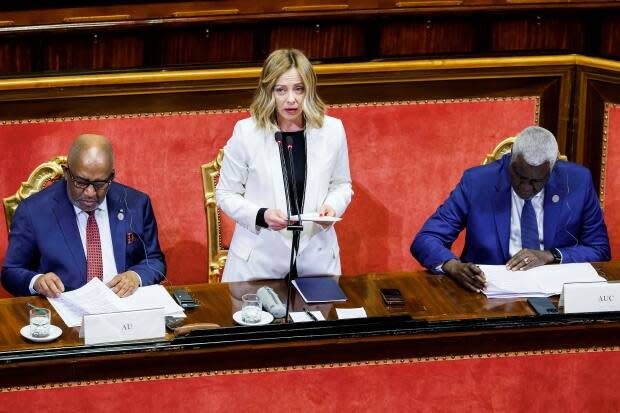Why Italy's far-right leader Giorgia Meloni is sure to get a warm reception in Canada

- Oops!Something went wrong.Please try again later.
- Oops!Something went wrong.Please try again later.
- Oops!Something went wrong.Please try again later.
This weekend, Canada will play host to Italian Prime Minister Giorgia Meloni, who is widely regarded as that country's most right-wing leader since the fascist dictator Benito Mussolini. But don't expect that detail to come up.
Meloni will be in Toronto this Saturday for a meeting with Prime Minister Justin Trudeau, and it is expected to be a cordial one. Meloni's visit, reads a news release from the Prime Minister's Office, will build on the "close relationship" Canada has with Italy, a steadfast ally in "defending democracy around the world."
The statement is a far cry from the public criticism Trudeau lobbed at Meloni at a meeting of the G7 last year. There, he voiced "concern" about the Italian prime minister's positions on 2SLGBTQ+ rights, which included plans to revoke parental rights for gay couples with children.
But a lot can change in a year. Since last May, experts say Meloni has deftly performed a delicate balancing act, advancing centrist positions on the international stage while appeasing a far-right base at home. In the process, she has become a key power player in Europe amid a wider surge in right-wing sentiment across the continent.
"I expect Trudeau to be much more gentle with Meloni this time around," said Amy Verdun, director of the University of Victoria's European studies program, in an email. "There is a more right-wing wind blowing in Europe…. On the whole we do not know where all this is going. But for people on the left, it is a worrying trend."

Growing influence
Before coming to power, Meloni was known for her fiery speeches against "globalist" institutions such as the European Union. But since becoming premier, she has been positioning herself as a powerful player at the European Parliament.
As leader of a large right-wing bloc, Meloni's tough talk on immigration has increasingly dictated the direction of EU policy. She was instrumental in the development of its new migration plan, which will increase relocations and refusals, and has built a close relationship with European Commission President Ursula Von Der Leyen.
"They have helped each other many times, supporting each other politically," said Teresa Coratella, a program manager for the European Council on Foreign Relations in Rome.
With upcoming European elections expected to hand a quarter of seats to far-right parties like Meloni's, Von Der Leyen has been actively courting Meloni's approval, making frequent visits to Italy and statements in favour of her harsh policies on migration.
"Meloni played her cards on the European tables very well," said Lorenzo Castellani, a political analyst at the LUISS Guido Carli university in Rome. "She will be one of the largest … players in the next election."
Intercontinental ambitions
Now, Meloni's ambitions have extended across the Mediterranean, with a new investment plan that would transfer billions in cash to African countries. The strategy is one of the topics that is expected to be under discussion Saturday.
Though the PMO's statement says the strategy could help "promote peace, development, and prosperity across the continent," it is widely understood to be aimed primarily at curbing immigration flows from North Africa.

"This plan might create some sort of exchange," said Castellani. "You can use this cash for drilling oil or building schools and bridges, but the underlying motivation is first and foremost to stop illegal immigration — or at least to limit it."
The plan has already drawn criticism for proposing large cash transfers to unstable regimes with poor human rights records, in exchange for implicit promises to prevent refugees from getting out.
And while Meloni's migration strategy has earned the support of European politicians fearing a far-right surge at home, it has appalled human rights organizations, which have decried policies that offshore immigration processing to Albania, fund Libyan warships that illegally push back refugees, and criminalize the rescue of drowning migrants at sea.
'Draconian' policies at home
Meanwhile, since Trudeau voiced concern last year, Meloni has only accelerated the erosion of 2SLGBTQ+ rights in Italy. Last summer, she outlawed international surrogacy, and carried through on threats to revoke the legal rights of dozens of gay parents.
Her government has earned rare rebukes for its harsh policing of protests, passed "draconian" new laws targeted at youth crime and spurred controversy by clearing critics from cultural institutions like the public broadcaster.
More recently, she's raised alarm by proposing constitutional reforms that critics say parallel those enacted by Mussolini in the 1920s, which would likely hand sweeping new powers to her office.
And while analysts admit she's been successful in shaking her party's fascist associations internationally, she is still routinely embarrassed in Italy by members of her own party attending neo-fascist rallies — events which she often avoids condemning.
"It's like she has a double face," said Coratella. Internationally, she has been encouraged to moderate her positions — but at home, she faces the opposite pressure: a fractious coalition of far-right politicians she must appease to survive until the end of her mandate.
Shifting landscape
But analysts say little of this is likely to factor into Trudeau's discussion with Meloni Saturday. His high-profile critique last year was "mostly for a Canadian audience," according to Ruben Zaiotti, a professor of political science at Dalhousie University in Halifax.
"Trudeau … did what he had to do last year at the G7," Zaiotti said. "The [Meloni] government was new, so it wasn't yet clear if [it] would be playing by the same tune as the rest of the G7. But since then, she's done exactly that."
With ongoing conflicts in Ukraine and Gaza, maintaining unity in groups like NATO, the G7 and the EU may simply be more important now than policing the domestic politics of foreign leaders, analysts say. The bulk of the meeting is expected to focus on priorities like aid to Ukraine and support for Israel, two files where Meloni has remained in lockstep with her more mainstream allies.
"On the international level, the issues today are Ukraine, Russian aggression, Israel-Gaza," said Zaiotti. "There's a lot of overlap between what she wants and what Trudeau wants."
With the prospect of another right-wing leader occupying the White House next year, Canada may also not have the luxury of choice when it comes to its allies.
"I'm not sure that Justin Trudeau's foreign policy has been as successful as he wants," said Sir Graham Watson, a professor at the Munk School of Global Affairs and a former member of the European Parliament. "Maybe he is interested in closer relations with Europe…. Relations between Canada and Italy could perhaps be strengthened."
"Even if [its] European allies might not be of the same political colour," said Verdun, "it is in Canada's interest, at the moment, to be diversifying its relationships."

